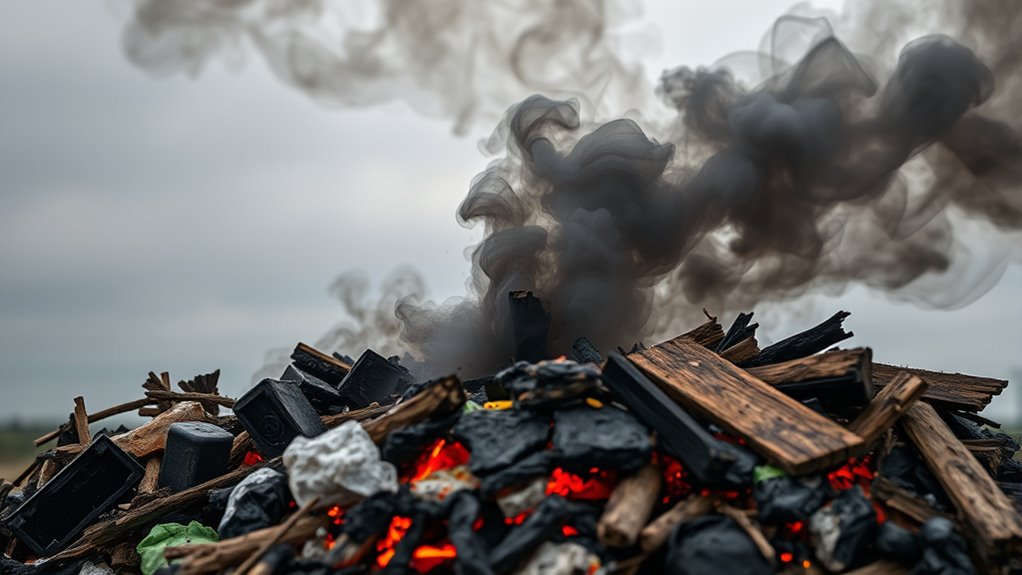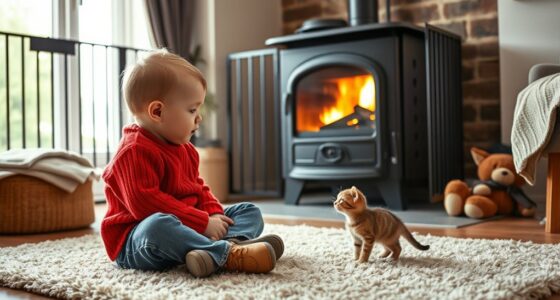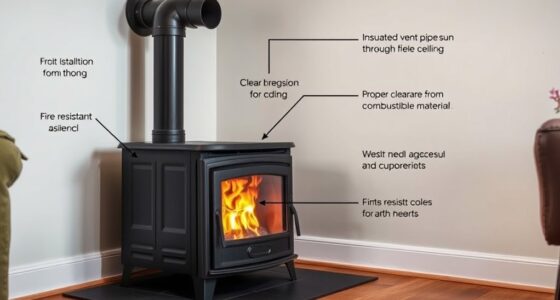Burning trash, plastics, and treated wood releases dangerous toxins like dioxins, furans, and other hazardous chemicals that harm your health and pollute the environment. These toxins settle into the air, water, and soil, affecting wildlife, plants, and people. Instead of burning, you can recycle, compost, or dispose of waste properly to protect yourself and the planet. Keep going to find out how safe waste management benefits everyone involved.
Key Takeaways
- Burning trash releases toxic chemicals like dioxins and furans, harming health and the environment.
- Plastics emit hazardous substances during combustion, contaminating air, water, and soil.
- Treated wood releases harmful toxins such as arsenic and creosote when burned.
- Proper recycling and waste management prevent pollution and reduce health risks.
- Burning trash is outdated; sustainable disposal methods protect ecosystems and public health.

Burning trash might seem like a quick and easy way to dispose of waste, but it poses serious health and environmental risks. When you burn household waste, especially plastics and treated wood, you release harmful chemicals into the air that can affect your health and the environment. Instead of burning, you should consider the recycling benefits and proper waste management methods available to you. Recycling helps reduce the amount of waste sent to landfills and minimizes pollution, making it a smarter, safer choice for everyone.
Burning trash releases harmful chemicals, harming health and the environment. Recycling and proper waste management are safer alternatives.
By burning trash, you’re not just creating air pollution—you’re also contributing to environmental degradation. Plastics, when burned, release dioxins, furans, and other toxic compounds that contaminate the air, water, and soil. These substances don’t just disappear; they settle and accumulate, harming wildlife, plants, and human health. Burned treated wood, often containing chemicals like arsenic or creosote, releases toxins that can linger in your community’s air and water supply, increasing the risk of respiratory problems and other health issues. If you care about the environment and your community’s well-being, you should avoid burning these materials entirely.
Instead of burning trash, focus on waste management strategies that are safer and more sustainable. Recycling is a key part of responsible waste management—it reduces the volume of waste and conserves natural resources. Many plastics, metals, and paper products can be recycled and repurposed, which decreases the need for raw material extraction and manufacturing. Proper disposal of hazardous materials, such as treated wood or electronic waste, ensures these substances are handled by professionals who can prevent environmental contamination. Composting organic waste like food scraps and yard waste also plays a crucial role in reducing landfill volume and producing nutrient-rich soil. Additionally, adopting sustainable waste practices helps in reducing overall waste and pollution.
Furthermore, adopting waste management practices like reducing consumption, reusing items, and composting not only minimizes waste but also lessens the need to burn trash. These efforts contribute to cleaner air, healthier ecosystems, and a safer community. Furthermore, many local governments and waste management programs provide resources and guidelines to help you dispose of waste responsibly. Educating yourself about these options can make a significant difference in your community’s overall health and environmental footprint.
In the end, burning trash might seem like an easy fix, but it’s an outdated practice that causes more harm than good. Embracing recycling benefits and improving waste management practices are essential steps toward a healthier planet. When you choose not to burn, you’re actively participating in protecting the environment, safeguarding public health, and promoting sustainable living.
Frequently Asked Questions
What Are Alternative Ways to Dispose of Trash Safely?
You should recycle plastics and other materials through local recycling options to reduce waste. Composting methods help you dispose of organic waste responsibly, turning food scraps and yard waste into nutrient-rich soil. Avoid burning trash, as it releases harmful toxins. Instead, consider donating items or reusing them whenever possible. Proper disposal not only protects the environment but also keeps your community clean and safe.
How Does Burning Trash Impact Local Wildlife and Ecosystems?
Think of burning trash as an invisible poison cloud drifting into your backyard. It harms wildlife health by exposing animals to toxic chemicals released from plastics and treated wood. This practice also causes ecosystem disruption, harming plants and water sources. When you burn waste, you’re not just clearing clutter—you’re endangering the delicate balance of your local environment, turning a simple act into a threat to countless creatures and natural systems.
Can Burning Plastics Cause Long-Term Soil Contamination?
Burning plastics can cause long-term soil contamination through chemical leaching, which pollutes the soil over time. When plastics burn, toxic chemicals like dioxins and heavy metals settle into the ground, leading to soil pollution that affects plants, animals, and even groundwater. This process makes the land unsafe for farming and can harm ecosystems, so it’s best to avoid burning plastics altogether to protect your environment.
Are There Any Legal Penalties for Illegal Trash Burning?
Yes, there are legal penalties for illegal trash burning. You could face fines, community service, or even criminal charges if you violate waste regulations. Authorities enforce these laws to prevent environmental damage and protect public health. Ignoring waste regulations and burning trash illegally can lead to significant consequences. It’s essential to follow proper disposal methods and avoid illegal burning to stay within legal boundaries and help keep your community safe.
How Can Communities Promote Proper Waste Disposal Practices?
Imagine a vibrant garden thriving with healthy plants—that’s your community when everyone practices proper waste disposal. You can promote this by raising community awareness through workshops, social media, and local events. Encourage residents to participate in waste management programs, provide clear disposal guidelines, and highlight the health and environmental benefits. Your efforts create a ripple effect, transforming trash into a catalyst for a cleaner, greener neighborhood everyone can take pride in.
Conclusion
You shouldn’t burn trash, plastics, or treated wood because it harms your health, harms the environment, and wastes resources. Burning releases toxic chemicals into the air, pollutes our planet, and wastes materials that could be recycled or disposed of properly. By choosing not to burn, you protect your community, preserve natural resources, and promote a cleaner, healthier world. Make the responsible choice—avoid burning trash, plastics, and treated wood for a safer, greener future.










